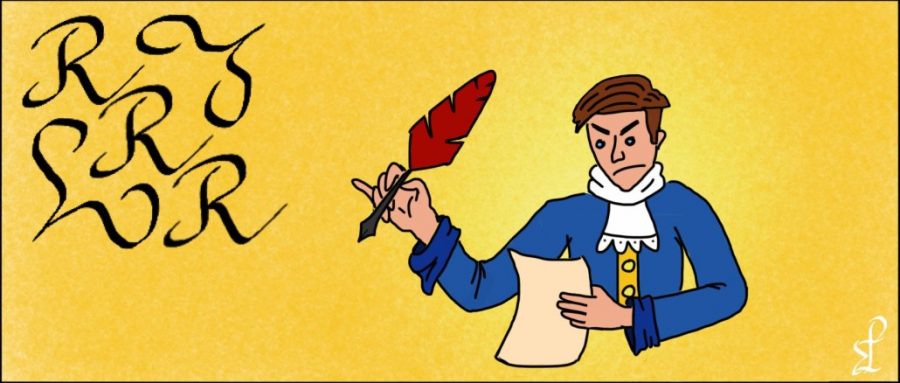RRR #6: Contractions Can’t Get It Together
“Whomst’d’ve” is not an English word. However, there are many other contractions that are, and I find that revolting. While I accept their contractile nature, the manner by which they are denoted is downright infuriating.
Honestly, though, contractions are great. Theyre really useful if you want to lessen the difficulty of saying hard expressions like “did not” and “Geoffrey is.” Often, common word combinations are shortened to contractions. This includes can not (can’t), should not (shouldn’t), is not (isn’t), and will not (wi’nt). In fact, contractions are so useful that we give them a little pin that they can wear and feel special about because theyre helping save the environment by taking up slightly less space on the page. But maybe contractions arent that great. Honestly, we can probably take them for granted by now, despite how unwillingly people use the correct spelling of the sound ðɛr (if you know me, you know that I think that it shouldnt matter in a casual context, as long as the meaning is easily conveyed). But we dont need to give contractions pins. We already give pins to another class of words, possessors. And while context may be sufficient in most cases to differentiate “Annika is” and “belonging to Annika,” context is a bore and I dont feel like relying on it. Honestly, I would hope that people are brilliant enough to know that after removing the apostrophe from the contraction “Annika’s,” meaning “Annika is,” we are not conveying the curious story of multiple Annikas. And it was at this moment that I knew I had made a slight judgmental error.
Heres the thing: I need to make a distinction between “Keira is” and “Keira has.” Both are traditionally contracted as “Keira’s.” If I am to follow the conventions I have just established, it would seem that I should remove the apostrophe from “Keira is,” and keep the apostrophe in “Keira has.” I would justify this by arguing that “has” indicates possession, and so the apostrophe stays. This sounds great until you realize that “has” does not indicate possession in the same way that an “apostrophe s” does. “Benjamin has a Shield column” world never be contracted to “Ben’s a Shield column,” because we both know that Ben is not, in fact, a Shield column. We dont use the contractile “apostrophe s” whenever “has” indicates possession. On the other hand, Keira has just completed her training to be a swimmer, and someone wants to convey this information via a text medium. This cheeky individual wishes to contract “Keira has,” but he doesnt know whether or not he should use an apostrophe. We say “Keira has,” but Keira doesnt have anything. To solve this problem, I will look at the specific structure of the sentence: “Keira has completed her training.”
Obviously, “Keira” is the subject of the sentence. “Training” is the direct object, the receiver of the action, and “her” is an adjective indicating her possession of the training. Normally, I would be inclined to simply call “has completed” a perfect-tense verb, but this is—unfortunately—not specific enough for our purpose. Indisputably, completed is some variety of verb-related word, and it definitely affects the direct object “training.” We know, though, that “has” is also a verb, one that indicated ownership, or some other sort of possession. What does it mean, literally, though? At this point, I was considering taking some easy way out. Maybe we should just ban “has” from participating in contractions. Maybe I need to ask a responsible adult for help with my autocratic language reform. But then, I thought: “I am become Death, destroyer of worlds.” Why not simply change convention so that “Keira is completed her training” is correct? “Completed” already sounds past tense, which is good enough for my nonexistent standards.
[Ed. Note — This is, in fact, how English used to work, which we believe is the point our columnist is making.]
Of course, this means I need to contend with “it’s/its.” Believe it or not, “it’s/its” is actually somewhat consistent with the rest of the language. When we look at the other third person pronouns, we see “hers” and “his.” If I want to talk about Barnabas’s credit score, I will say “his credit score.” I add a possession-indicating “s” to the end of “h” (sort of). Similarly, if I wanted to talk about how many views an advertisement featuring Phil Swift has, I would refer to “its view count.” Of course, we don’t use “hers” like that. Consider this scenario: I want to tell Josephine that I love Rachel’s glasses. Traditionally, I would write: “I love her glasses.” This is entirely unacceptable. Not only is it inconsistent with how possessors normally work, but it makes the first three words “I love her,” which I dont – at least, not in that way. The logical solution, then, is to write “I love her’s glasses.” We add an apostrophe to indicate possession, like we do in the rest of the language. Similarly, “I love hi’s glasses” should be used for possession. To maintain consistency, we will also need to switch its and it’s, so that “it’s” will be possessive (since all possessives have apostrophes now) and “its” will be a contraction of “it is,” since contractions no longer have apostrophes.
